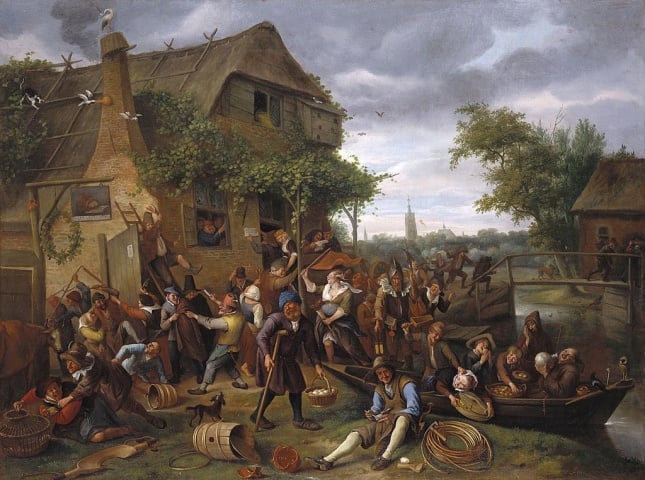
Isack van Ostade, A Village Fair, with a Church Behind (1643).
Photo: Royal Collection Trust/© Her Majesty Queen Elizabeth II 2015.
A recent conservation job has revealed a somewhat scandalous detail in a 17th-century Dutch painting owned by the UK’s Royal Collection Trust: a man peeing amid the food vendors and performers in A Village Street Fair with a Church, a charming 1643 street scene by Isack van Ostade.
The work joined the royal collection in 1810. The offending figure appears to have been covered in shrubbery during a 1903 restoration.
Isack van Ostade, A Village Fair, with a Church Behind (detail of the restored peeing figure), 1643.
Photo: Royal Collection Trust/© Her Majesty Queen Elizabeth II 2015.
Thanks to the careful work of conservators, the squatting man can be clearly seen doing his business once again.
The van Ostade isn’t the first Dutch painting in the royal family’s collection to have had such a touch-up: restorers replaced the offending image of a man pulling down his pants to expose his butt with a bull’s head on a tavern sign in Jan Steen’s A Village Revel (1674).
Jan Steen, A Village Revel (1673).
Photo: Royal Collection Trust/© Her Majesty Queen Elizabeth II 2015.
A Village Street Fair is slated to be included in “Masters of the Everyday: Dutch Artists in the Age of Vermeer,” opening on November 13 at Buckingham Palace’s Queen’s Gallery.
“Dutch artists often include people or animals answering the call of nature partly as a joke and partly to remind viewers of that crucial word ‘nature,’ the inspiration for their art,” said Desmond Shawe-Taylor, surveyor of the Queen’s pictures and curator of the exhibition, in a statement. “Queen Victoria thought the Dutch pictures in her collection were painted in a ‘low style;’ two years after her death perhaps a royal advisor felt similarly.”
Jan Steen, A Village Revel (detail with offending tavern sign once censored by restorers and now returned to its original state), 1673.
Photo: Royal Collection Trust/© Her Majesty Queen Elizabeth II 2015.
The Trust also recently discovered that a small, diamond-encrusted Fabergé elephant acquired by King George V in 1935 was actually the missing surprise from the imperial Diamond Trellis Egg commissioned by Russian Czar Alexander III in 1892.
Currently, the Trust is also exhibiting “Long to Reign over Us,” a selection of photographs of Queen Elizabeth II, in honor of her becoming the country’s longest-reigning monarch.
“Masters of the Everyday: Dutch Artists in the Age of Vermeer” is on view at the Royal Collection Trust at the Queen’s Gallery, Buckingham Palace, November 13, 2015–February 14, 2016.